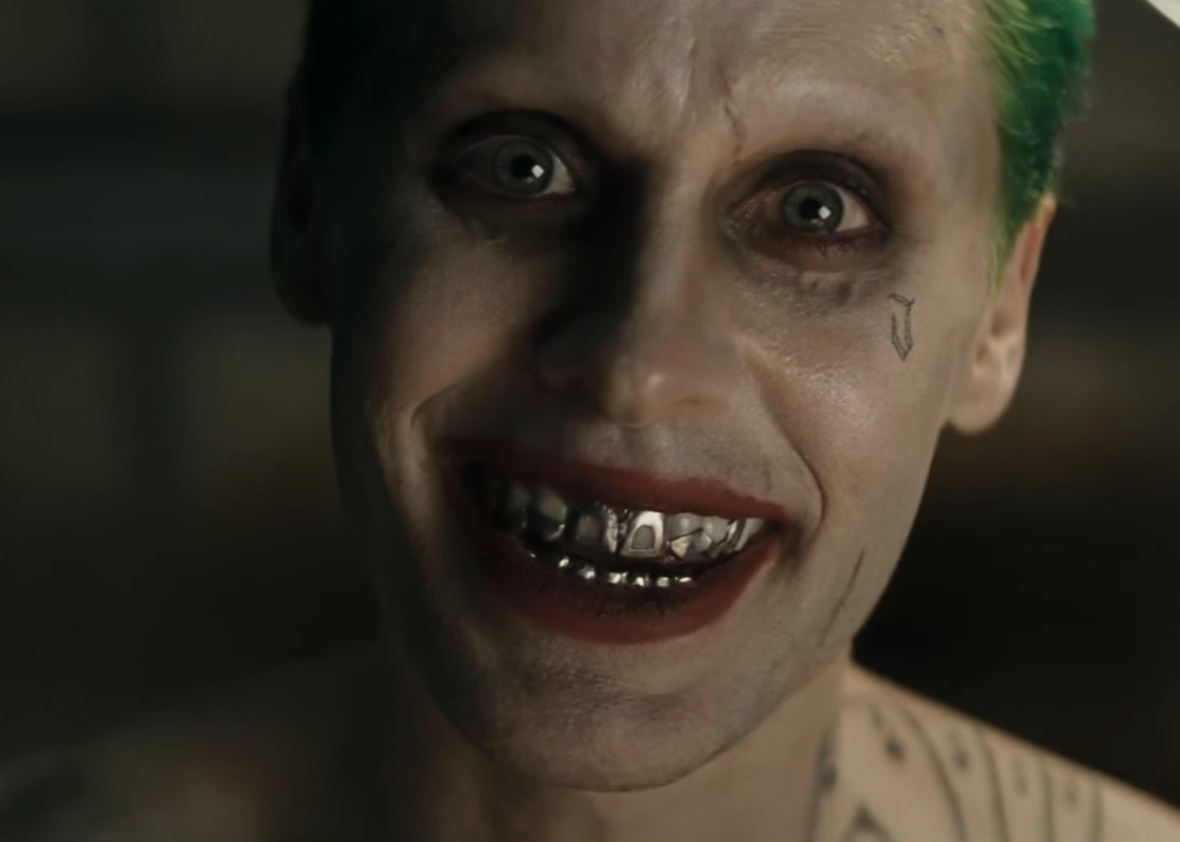There’s a formula to making movie trailers, the many ingredients of which (quirky indie music, dramatic title cards, and so on) have been pointed out, and parodied, again and again. Lately, though, we’ve seen the rise of a different recurring trailer trope: Familiar pop songs remade as creepy, dirge-like soundtracks.
One of the most recent examples is the Suicide Squad trailer, which premiered at Comic-Con earlier this month. As Viola Davis’ Amanda Waller describes assembling her crew of villains, the ominous music bubbles beneath her monologue until an echoey, child-like female vocal chimes in. The song lyrics are, in fact, from one of the Bee Gees’ lesser-known hits, “I Started a Joke.” And several other recent trailers have taken a page from this book: Avengers: Age of Ultron (“I’ve Got No Strings”), Amy (“Back to Black”), and Birdman (“Crazy”), among others.
How did we go from simply using pop songs in trailers to refashioning them as haunting, melancholic tunes? The roots of this trend can probably be traced all the way back to the “ironic nursery rhyme,” which involves putting a dark twist on sweet, innocent ditties for dramatic effect, and has appeared in films like The Birds and A Nightmare on Elm Street. In fact, when the latter film was remade, the trailer, released in 2009, made that nursery rhyme the soundtrack.
But one of the earliest examples of the creepy-pop-song-cover-trailer (and the one that may be most responsible for this recent trend) is 2010’s The Social Network, and its cover of Radiohead’s “Creep” by Belgian girls choir Scala & Kolacny Brothers. (That version of the song originally appeared on the choir’s album On the Rocks several years earlier.) Marcy Bulkeley, music director for the movie trailer production house Wild Card (she’s worked on the campaign for, among other films, Inception), told me that the appeal of creep-ifying pop songs is to play with tension between the connotation of the song and its actual sound. “What the cover song does is it gives the audience something to grab onto within the first 10 seconds of hearing it, it gives them something to recognize,” says. “So they’d be like, ‘Oh, I know this song,’ ” until they realize that something about the tune is actually uncannily new. And sometimes, viewers don’t even recognize the song at all until the lyrics come in, which creates its own kind of eerie dissonance.
According to Bulkelely, several music libraries, publishing companies, and music agencies now have in-house artists who create pop song covers specifically for trailers. There’s a company called Pusher Music that makes cover albums “in a very creepy, slower [way]. Like taking a Rihanna song and turning it into something a little slower that has the typical trailer structure to it.” And often there are logistical reasons for forgoing a song in its original form— for one thing, as Bulkelely explains, it’s easier to get permission to run covers of copyrighted songs than the original songs themselves. There’s also the added benefit of giving small bands more exposure. “You get more unknown artists, but sometimes these artists are known—like Big Black Delta, they’re picking up steam, they did a Cars cover. It allows us to use songs that might not normally get considered for trailers.” One such example is the Comic-Con trailer for Mad Max: Fury Road, which features a barely recognizable cover of Cat Stevens’ “Wild World” created by Confidential Music:
Sometimes the songs are remixes rather than outright covers, as when Beyoncé and producer Boots recorded a slinkier version of “Crazy in Love” for the Fifty Shades of Grey trailer. For Ron Howard’s upcoming thriller In the Heart of the Sea, Bulkeley and her team got permission to take stems—individual pieces—of the song “Wave” by Beck and manipulate them for the trailer. There were over 60 pieces of the song to use, she said, including an echo chamber, Beck’s vocals, and background vocals.
They worked with a film and advertising music production house called Ninja Tracks—they gave Ninja Tracks the stems of the song and told them that the movie is based on the Moby Dick story: “these men are at sea, and there’s a big whale that’s messing with them.” They also told the production house that they “needed it to sound very mysterious, very slow, creepy, and then build in a way that shows intensity and drama and excitement.” Not all artists are as into the idea of having their music remixed as Beck and Beyoncé, however—“Sometimes the original artist does not want their work compromised or changed in any way. … Creating a remix versus leveraging a cover really depends on how difficult or easy the artist and/or project are.”
So why exactly are movie trailers using twisted versions of Bee Gees pop songs and not, say, upbeat covers of “Yesterday”? It could be because so many of the biggest movies are taking the twisted route themselves. “They fit the trailers coming out right now,” says Bulkeley. “These eerily remixed songs have more of an impact on the audience. An audience hears something that they usually equate to feeling happy or upbeat, and hav[ing] it flipped upside-down makes them pause for a moment. While it’s a familiar song, the remix gives them an entirely different feeling.”
